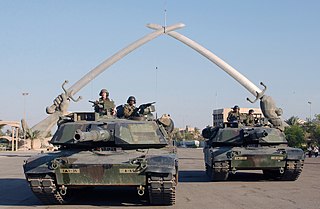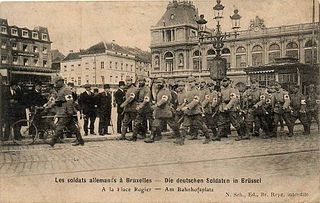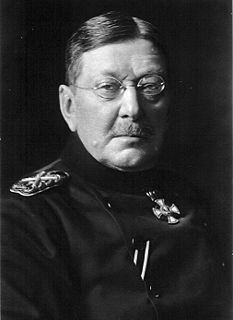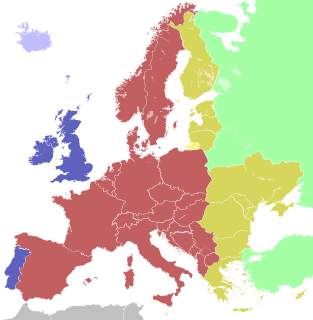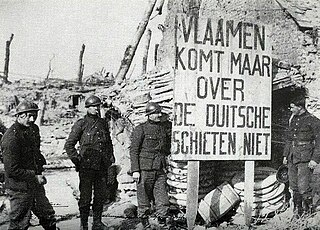Reichskommissar, in German history, was an official gubernatorial title used for various public offices during the period of the German Empire and the Third Reich.

Hans Hartwig von Beseler was a German Colonel General.

Upon defeat of Nazi Germany in World War II, the victorious Allies asserted joint authority and sovereignty over 'Germany as a whole', defined as all territories of the former German Reich west of the Oder–Neisse line, having declared the destruction of Nazi Germany at the death of Adolf Hitler. The four powers divided 'Germany as a whole' into four occupation zones for administrative purposes, under the United States, United Kingdom, France and the Soviet Union respectively; creating what became collectively known as Allied-occupied Germany. This division was ratified at the Potsdam Conference. The four zones were as agreed in February 1945 by the United States, United Kingdom and Soviet Union meeting at the Yalta Conference; setting aside an earlier division into three zones proposed by the London Protocol.

The Territory of the Military Commander in Serbia was the area of the Kingdom of Yugoslavia that was placed under a military government of occupation by the Wehrmacht following the invasion, occupation and dismantling of Yugoslavia in April 1941. The territory included only central Serbia, with the addition of the northern part of Kosovo, and the Banat. This territory was the only area of partitioned Yugoslavia in which the German occupants established a military government. This was due to the key rail and riverine transport routes that passed through it, and its valuable resources, particularly non-ferrous metals. On 22 April 1941, the territory was placed under the supreme authority of the German military commander in Serbia, with the day-to-day administration of the territory under the control of the chief of the military administration staff. The lines of command and control in the occupied territory were never unified, and were made more complex by the appointment of direct representatives of senior Nazi figures such as Reichsführer-SS Heinrich Himmler, Reichsmarschall Hermann Göring, and Reichsminister Joachim von Ribbentrop. The Germans used Bulgarian troops to assist in the occupation, but they were at all times under German control. Sources variously describe the territory as a puppet state, a protectorate, a "special administrative province", or describe it as having a puppet government. The military commander in Serbia had very limited German garrison troops and police detachments to maintain order, but could request assistance from a corps of three divisions of poorly-equipped occupation troops.

The Military Administration in France was an interim occupation authority established by Nazi Germany during World War II to administer the occupied zone in areas of northern and western France. This so-called zone occupée was renamed zone nord in November 1942, when the previously unoccupied zone in the south known as zone libre was also occupied and renamed zone sud.

Reichskommissariat is the German designation for a type of administrative entity headed by a government official known as a Reichskommissar. Although many different such offices existed primarily throughout the Imperial German and Nazi periods in a number of different fields it is most commonly used to refer to the quasi-colonial administrative territorial entity established by Nazi Germany in several occupied countries during World War II. While officially located outside the German Reich in a legal sense, these entities were directly controlled by their supreme civil authorities, who ruled their assigned territories as German governors on behalf of and as direct representatives of Adolf Hitler.

The Military Administration in Belgium and Northern France was an interim occupation authority established during the Second World War by Nazi Germany that included present-day Belgium and the French departments of Nord and Pas-de-Calais. The administration was also responsible for governing the zone interdite, a narrow strip of territory running along the French northern and eastern borders. It remained in existence until July 1944. Plans to transfer Belgium from the military administration to a civilian administration were promoted by the SS, and Hitler had been ready to do so until Autumn 1942, when he put off the plans for the time being. The SS had suggested either Josef Terboven or Ernst Kaltenbrunner as the Reich Commissioner of the civilian administration.
During World War II, Nazi Germany created military-led regimes in occupied territories which were known as a Military administration or Military administration authority. These differed from Reichskommissariate which were led by Nazi Party officials. A Military administration was normally led by a "military commander".
Military occupations of France may refer to

The Military Administration in Poland refers to the military occupation authority established in the brief period during, and in the immediate aftermath of, the German invasion of Poland, in which the occupied Polish territories were administered by the Wehrmacht, as opposed to the later civil administration of the Generalgouvernement.

The General Government of Warsaw was an administrative civil district created by the German Empire in World War I. It encompassed the north-western half of the erstwhile Russian-ruled Vistula Land.
SS-GruppenführerEggert Reeder was a German jurist, civil servant, and district President of several regions. Reeder served as civilian administrator of Wehrmacht occupied Belgium and northern France when Nazi Germany occupied those countries during World War II.

The German invasion of Belgium was a military campaign which began on 4 August 1914. Earlier, on 24 July, the Belgian government had announced that if war came it would uphold its historic neutrality. The Belgian government mobilised its armed forces on 31 July and a state of heightened alert was proclaimed in Germany. On 2 August, the German government sent an ultimatum to Belgium, demanding passage through the country and German forces invaded Luxembourg. Two days later, the Belgian Government refused the demands and the British Government guaranteed military support to Belgium. The German government declared war on Belgium on 4 August, troops crossed the border and began the Battle of Liège.

The history of Belgium in World War I traces Belgium's role between the German invasion in 1914, through the continued military resistance and occupation of the territory by German forces to the armistice in 1918, as well as the role it played in the international war effort through its African colony and small force on the Eastern Front.

The Vlaamsche Hoogeschool, commonly known as the von Bissing University, was a Dutch-speaking university in Ghent established in German-occupied Belgium in October 1916. The university, which was separate from the existing Ghent University, formed part of the German Flamenpolitik and was a response to the long-established grievance of the Flemish Movement which campaigned against Ghent University's curriculum being taught only in French, despite the university being located in a majority Dutch-speaking region. The institution took its informal name from Moritz von Bissing, the German Governor-General of Belgium from 1914 to 1917, who was one of the chief proponents of the Flamenpolitik.

The Reichskommissariat of Belgium and Northern France was a German civil administration (Zivilverwaltung) which governed German-occupied Belgium during World War II. The Reichskommissariat replaced an earlier military government, the Military Administration in Belgium and Northern France, established in the same territory in 1940. On 18 July 1944, the first Gauleiter, Josef Grohé, was named the first Reichskommissar of the territory, known as the Reichskommissariat Belgien und Nordfrankreich or Reichskommissariat für die besetzten Gebiete von Belgien und Nordfrankreich.

The German occupation of north-east France refers to the period in which French territory, mostly along the Belgian and Luxembourgish border, was held under military occupation by the German Empire during World War I. Owing to the speed of the German invasion of Belgium in 1914, fighting reached French soil early in the war. Though their advance was stopped at the First Battle of the Marne in September 1914, the Germans gained control of a portion of French territory which remained under German occupation behind the stabilized Western Front for much of the rest of the war.


